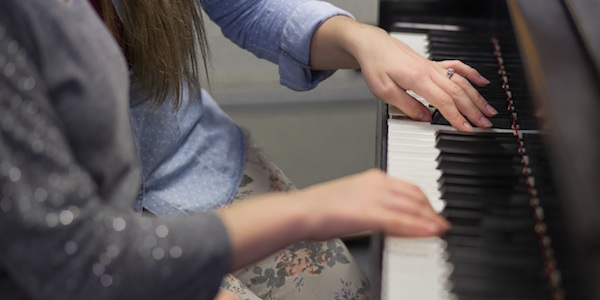
Harmonizing Extracurriculars and Academics
Music Hall is filled with the sounds of students practicing flutes, horns and pianos. Inside one of the practice rooms Marena Bartz is teaching piano to a junior high student. It’s one of many activities in her busy schedule.
“Studying music takes a lot of discipline,” Bartz says. “I started playing piano at seven, and my teachers still expect me to practice every day. That can be challenging.”
Keeping up with Bartz’s schedule also can be challenging. Along with piano lessons, she’s mentoring peers, singing and performing, working in a research lab and pursuing a double major.
Bartz will finish her genetics degree in December and plans to graduate in music education in the spring of 2018. Both majors are in smaller departments and Bartz says it’s helped her feel at home at Iowa State University.
“I know most of the students in my classes and I think that camaraderie is something you don’t always find,” Bartz says.
She credits her genetics learning community, The Secret of Life, for helping her get to know her peers. Now she serves as a peer mentor. Bartz says students sometimes find it easier to ask their peers for advice.
“Students may feel like they have to have everything lined up to meet with an adviser, but they can come to us when they aren’t sure what they are doing,” Bartz says.
In February, Bartz shared her expertise at a workshop titled Creating the Future Workforce in Food and Agriculture at the National Academy of Sciences in Washington, D.C. She was invited to represent Iowa State’s College of Agriculture and Life Sciences.
The meeting was organized by the Board on Agriculture and Natural Resources, which is a major part of the National Academies of Sciences, Engineering, and Medicine. Members of the board asked for input from university students about incorporating experiential learning, internships, club activities and hands-on research into the curriculum.
Bartz says the only resource she lacks is time. In addition to being a peer mentor, she’s president of the Genetics Club. She also works as an undergraduate research assistant in the plant pathology and microbiology department helping with research on soybean cyst nematodes.
“Marena has a jam-packed schedule juggling two very different majors, research lab work and work as a peer mentor,” says Lois Girton, Iowa State biology and genetics adviser. “As a peer mentor, she provides assistance to indi- vidual students and the group as a whole.”
When it comes to her music, Bartz says she enjoys teaching more than performing. She will student teach in the spring of 2018 before graduating with her vocal education degree. After graduating she plans to move back to Grafton, Iowa, to help with her parents’ grain farm, work with her husband to build a livestock operation and teach private music lessons.



